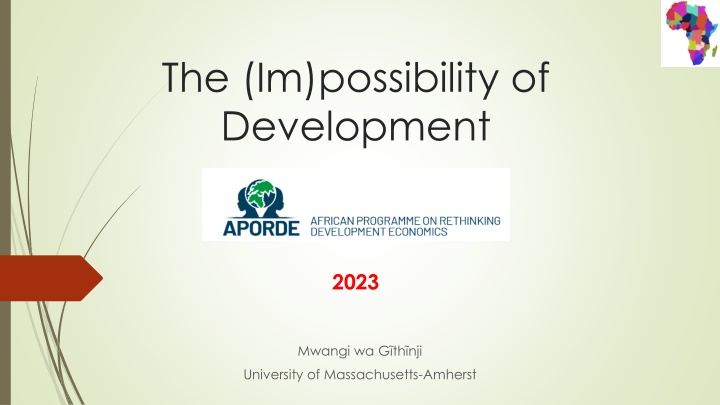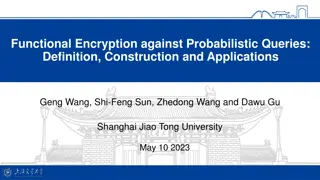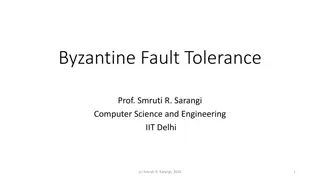
Development Paradigms and Colonization Effects
Explore the intricate relationship between development models, colonization, and their impact on societies throughout history. Delve into topics like deficit models, late colonization as capitalist development, and the interrogation of colonization practices. Gain insights into how land, labor, and economies were dispossessed, reshaped, and controlled, shedding light on historical intricacies shaping contemporary global contexts.
Download Presentation

Please find below an Image/Link to download the presentation.
The content on the website is provided AS IS for your information and personal use only. It may not be sold, licensed, or shared on other websites without obtaining consent from the author. If you encounter any issues during the download, it is possible that the publisher has removed the file from their server.
You are allowed to download the files provided on this website for personal or commercial use, subject to the condition that they are used lawfully. All files are the property of their respective owners.
The content on the website is provided AS IS for your information and personal use only. It may not be sold, licensed, or shared on other websites without obtaining consent from the author.
E N D
Presentation Transcript
The (Im)possibility of Development 2023 Mwangi wa G th nji University of Massachusetts-Amherst
Outline 2 Development as a deficit model Late Late Colonization as Capitalist Development Interrogating Colonization Rethinking Development Spherical Metaphors What is to be done? Mwangi wa G th nji UMASS-Amherst APORDE2023
Development as a deficit model 3 How have we understood the history of the development of human societies? As teleology Creation of dualities Traditional -------Modern Oral ---------------Written Agrarian ----------Industrial Poor ---------------Rich Mwangi wa G th nji UMASS-Amherst APORDE2023
Late Late Colonization as Capitalist Development 4 Late Late Colonization (1884-85 Berlin Conference) Why? Industrialization markets and raw materials Latin America and Caribbean Independence End of Slave trade and Slavery (1888 Brazil) German Unification Mwangi wa G th nji UMASS-Amherst APORDE2023
Interrogating Colonization 5 Moments of Colonization/Dispossession Land and Ecology Labour Economy Native Minds Citizenship and Rights Mwangi wa G th nji UMASS-Amherst APORDE2023
Dispossessing Land, Ecology and Diets 6 Recreating Landscapes the Colony as Plantation Creating Capitalist Private Land - The Original Land Grab Creating new landscapes and ecologies Communal to private landscapes transforming diets Mwangi wa G th nji UMASS-Amherst APORDE2023
Dispossessing Labour 7 Colonization as management of Surplus Labour in the Marxian sense of the term (NOT excess population) Creating a cheap labour force Taxes Debt obligations Labour Control Passbook Passport and immigration controls Quantitative and Qualitative restrictions Export controls - Flowers Native reproduction for colonial production articulating the capitalist sphere with native production "informal Sector" Mwangi wa G th nji UMASS-Amherst APORDE2023
Economic Dispossesion 8 Milking economies economies created to transfer surplus to metropolis rail lines to coast impact of this is development is along lines little manufacturing capacity built in fact destroyed purposefully disarticulation -Consumed what they did not produce, produced what they did not consume Currency Boards and the management of colonial reserves IMF/WB and Global Financial architecture Mwangi wa G th nji UMASS-Amherst APORDE2023
Dispossessing History Native Minds and Memory 9 "The status of 'native' is a nervous condition introduced and maintained by the settler among colonized people with their consent." Jean Paul Satre in introduction to Fanon's Wretched of the Earth. Rewriting Histories Histories of discovery Creating Racial Hierarchies Religious Imposition or Control Native religions as superstition education and Christianity Controlling Islam Language Mwangi wa G th nji UMASS-Amherst APORDE2023
Dispossessing Citizenship 10 Creating the Native Define and Rule Class and ethnicity the transformation of local elites from Land control to gate keepers of entry into capitalist jobs Mwangi wa G th nji UMASS-Amherst APORDE2023
Colonial and Post-Colonial Outcomes 11 Post Colony inherited the structures of the colonial past Why no change? doubling down on existing structures no need for loyal opposition imposed unity Result- Post Colonial states exist in an imagined marginal space between dualities of: Traditional -------Modern Oral ---------------Written Agrarian ----------Industrial Poor ---------------Rich Mwangi wa G th nji UMASS-Amherst APORDE2023
12 What is to be done? Mwangi wa G th nji UMASS-Amherst APORDE2023
The Triple Challenge of Late Late Development 13 African Countries Must transform their economies in a different context than previous structural transformations: Multiparty Elections/Democracy/Human Rights Global Climate Change Inequality Mwangi wa G th nji UMASS-Amherst APORDE2023
Rethinking African Development Spherical Metaphors 14 Development not linear but multi-dimensional Different paths embedding development in the local E.g. Can democracy reflect the local? what should democratic institutions look like in post-colonial countries? Who gets represented? What gets represented? Celebrating Local successes and learning from them Research that takes the actual conditions of our countries rather than cut and paste modelling Listening to African voices Making Markets work for People not the other Way round Reinvigorating Pan-Africanism Mwangi wa G th nji UMASS-Amherst APORDE2023
Radical Inclusion as Principle 15 Creating an inclusive development paradigm creation of citizens a process of radical inclusion both locally and globally some dimensions of inclusion? gender class ethnicity language religion abilities regions and ecologies This are dimensions that we need to think about as we create policy Note change is difficult and can be painful. Trust and belief in better future therefore is essential and this is achieved more easily under conditions of equality. Mwangi wa G th nji UMASS-Amherst APORDE2023
Re-imagining the Nation 16 To set up a state is easy, but to create a nation is extremely difficult. We are still suffering the consequences. Murat Belge (2008) (speaking of Turkey) We cannot build what we cannot imagine and what we imagine is shaped by our belief in ourselves itself a function of memory Mwangi wa G th nji UMASS-Amherst APORDE2023






















